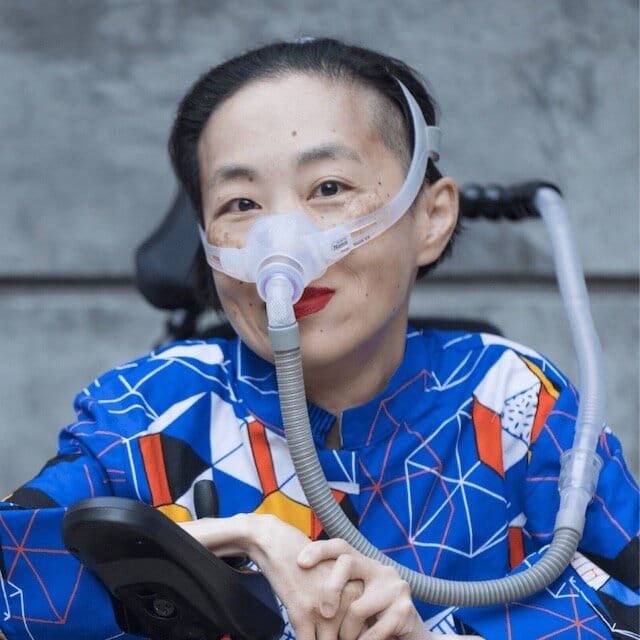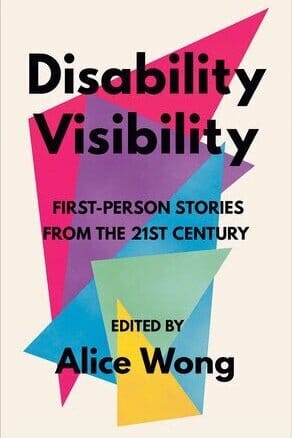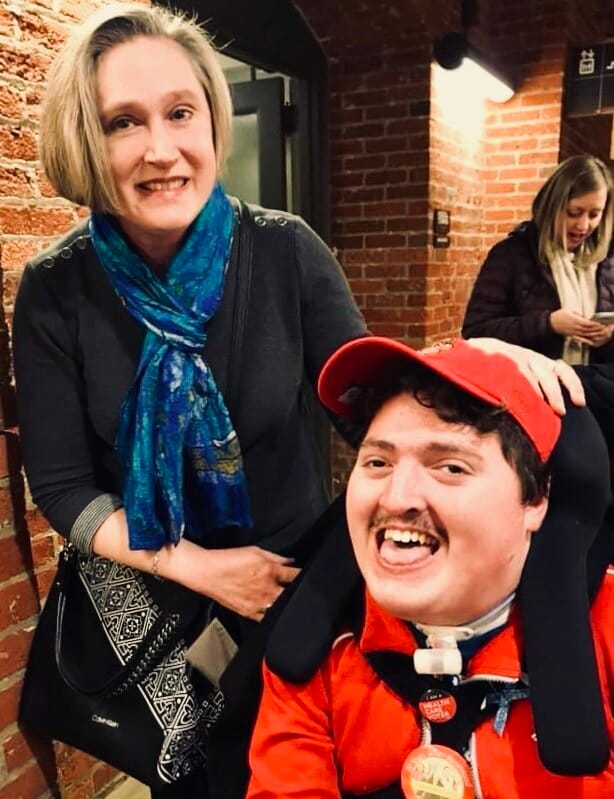Sharing the Journey with Jeneva: Staying Visible with Alice Wong

Photo of Alice Wong, an Asian American woman in a power chair. She is wearing a blue shirt with a geometric pattern with orange, black, white, and yellow lines and cubes. She is wearing a mask over her nose attached to a gray tube and bright red lip color. She is smiling at the camera. Photo credit: Eddie Hernandez Photography
Jeneva is thrilled to interview Alice Wong (she/her), a disabled activist, media maker, and consultant. Alice is the Founder and Director of the Disability Visibility Project® (DVP), an online community dedicated to creating, sharing and amplifying disability media and culture created in 2014. She is also the editor of Disability Visibility: First-Person Stories from the Twenty-first Century, an anthology of essays by disabled people, a book Jeneva has been reading.
Tell me about yourself.
I’m the daughter of Chinese immigrants and the oldest of three girls. We grew up in Indianapolis, Indiana, and I loved to read and write as a young person. The library was one of my favorite places in the world. As a disabled kid, it was a refuge. When I was a teenager, I knew that life was going to be better for me in California, so I moved to San Francisco for grad school in medical sociology, worked at UC San Francisco as a staff research associate for about 15 years, and ended up working full-time with the Disability Visibility Project a few years after creating it in 2014. And here we are now! I did not expect this path in my life, but am loving every minute of it. I am now who I have always meant to be.
Tell me about your medical needs and disabilities.
I have had a neuromuscular disability since birth and could walk until age 7 or 8, and I then used a manual wheelchair and quickly transitioned into a power chair. Over the years my body has weakened, so I started using personal assistance services full-time and using a Bi-Pap machine to help me breathe. At first, I only needed the Bi-Pap, a form of non-invasive ventilation, at night, but using it all day gives me more energy and ventilatory support so I can keep doing what I want to do.

Image of the cover of Disability Visibility: First-Person Stories from the 21st Century. The cover is a set of overlapping pink, purple, blue, green & yellow triangles, over laid with black sans-serif text.
Tell me about the origin of the Disability Visibility Project: When did you first imagine it? What did it take to get it rolling? How did the book evolve?
Originally it started as a one-year campaign to collect oral histories from the disability community in the lead-up to the 25th anniversary of the Americans with Disabilities Act in July 2015. I formed a community partnership with StoryCorps, an oral history nonprofit because I wanted us to have a chance to tell our own stories and create our own history. I initially thought I would interview people I knew who I thought were super interesting and cool in the SF Bay Area, and by using social media I was able to encourage disabled people across the country to participate as well. Right now people can still participate by using the StoryCorps app, and information can be found on my website. The DVP has grown and evolved into other activities such as guest essays, Twitter chats, a podcast, and other collaborations. I self-published an anthology in 2018, Resistance and Hope, and for the 30th anniversary of the ADA, I published a series of essays by disabled people of color on my website called #ADA30InColor with an audio and plain language version.
Disability Visibility: First-Person Stories from the Twenty-First Century came about when an editor from Vintage Books, Catherine Tung, emailed me out of the blue in 2018 asking if I had any interest in working on an anthology and I said, “YES!” After developing a book proposal and finding an agent, I got a book deal with them and worked on it for about a year and a half. This book is a labor of love by me for all of us. There’s a free discussion guide and plain language version on my website by disabled writers Naomi Ortiz and Sara Luterman, respectively. I hope it gives people some comfort and joy during these difficult times.
In your introduction to Disability Visibility (the book), you write, “To me, disability is not a monolith, nor is it a clear-cut binary of disabled and non-disabled. Disability is mutable and ever-evolving.” How do you hope “disability” will be imagined, categorized, or defined 100 years from now?
I’m so excited and ready for the future! I believe disability will expand and change–technologies and other adaptations may change our lives, but that doesn’t change the fact we are disabled in biological, cultural, or political ways.
You also write, “Storytelling can be more than a blog post, essay, or book. It can be an emoji, a meme, a selfie, or a tweet. It can become a movement for social change.” Storytelling is at the heart of Little Lobbyists—telling the stories of our children and helping our children tell their own stories. For some of our children, telling their own stories will be easier than for others. What can we, as parents, do to assist our kids with the essential task of self-narrative?
I would encourage parents to help their children discover their interests and passions. When you care about something deeply, it becomes part of your story and advocacy. I strongly believe each person can tell their story in their own way, whether it's from visual communication, gestures, or facilitated by a person or assistive technology. It's our responsibility to one another to not place certain forms and formats as “better.” We should meet people where they are in the ways they choose to communicate with the world.
It’s important to remember there will be a lot of kids who do not feel comfortable expressing themselves or being an advocate just yet and that’s ok! It took me until my early 20s before I thought of myself as an advocate. Also, no disabled person should ever feel obligated to be an advocate or tell their story–this should always be a voluntary activity. On another note, I was not able to express my anger and sadness as a child because I had to be this “compliant” patient and child. I grew up very fast and performed in front of adults to meet their expectations. There needs to be space for kids to share their stories and feelings even if it’s not what parents or the public expect.
What do you consider your first act of self-advocacy?
It’s hard to remember because like so many medically complex and disabled kids, I had to be an advocate at an early age before I ever knew the word. It was a means of survival in a world where I was made to feel acutely different. I had great parents and social support, but they could not understand my experiences. One of my first public acts of advocacy was writing a letter to the editor of Time magazine in the 1990s about accessible public transit, and it might have been the first time I wrote about a disability issue. And it was printed in the magazine, so that was a thrill!
How has advocacy shaped your life and given meaning to it?
Advocacy became less about my own individual needs and more about structural and institutional change. Advocacy connected me to communities and other people who had similar goals. I’ll always be thankful for being part of so many amazing communities because we are truly powerful when we work together.
If you could define advocacy in a single sentence, what would that be?
Advocacy is telling your truth and caring for others.
You can follow Alice Wong on Twitter @SFdirewolf @DisVisibility, and on Instagram @disability_visibility

Jeneva and her son Rob: Jeneva is wearing a blue scarf and grey dress, and Rob is seated in a wheelchair with an orange shirt and orange baseball cap.
We hope you enjoyed this installment of Sharing the Journey with Jeneva, a recurring feature on our Little Lobbyists blog. Through these interviews we will share the advocacy journeys of caregiver/parents and disability self-advocates, inspiring us to forge ahead together. Send an email to Jeneva if you have any questions you'd like to see, or if you'd like to be interviewed for a future installment of this series!
Jeneva Stone is the manager of the Little Lobbyists blog. She's worked as a teacher, a government editor, and a Hill staffer. Jeneva is also a writer, with numerous publications in poetry and nonfiction. She lives with her son Robert, who has complex medical needs and disabilities, her husband Roger, their two cats and a dog in Bethesda, Maryland. Her second child, Castin, is currently a student at Middlebury College.
